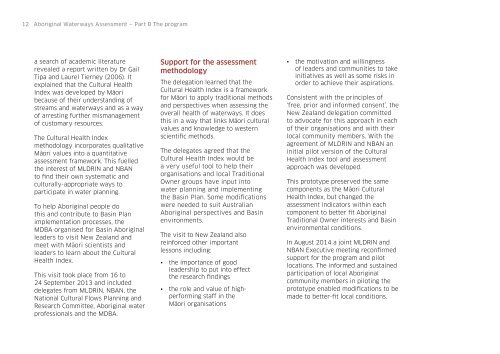Aboriginal Waterways Assessment program
dCckIF
dCckIF
Create successful ePaper yourself
Turn your PDF publications into a flip-book with our unique Google optimized e-Paper software.
12 <strong>Aboriginal</strong> <strong>Waterways</strong> <strong>Assessment</strong> — Part B The <strong>program</strong><br />
a search of academic literature<br />
revealed a report written by Dr Gail<br />
Tipa and Laurel Tierney (2006). It<br />
explained that the Cultural Health<br />
Index was developed by Māori<br />
because of their understanding of<br />
streams and waterways and as a way<br />
of arresting further mismanagement<br />
of customary resources.<br />
The Cultural Health Index<br />
methodology incorporates qualitative<br />
Māori values into a quantitative<br />
assessment framework. This fuelled<br />
the interest of MLDRIN and NBAN<br />
to find their own systematic and<br />
culturally-appropriate ways to<br />
participate in water planning.<br />
To help <strong>Aboriginal</strong> people do<br />
this and contribute to Basin Plan<br />
implementation processes, the<br />
MDBA organised for Basin <strong>Aboriginal</strong><br />
leaders to visit New Zealand and<br />
meet with Māori scientists and<br />
leaders to learn about the Cultural<br />
Health Index.<br />
This visit took place from 16 to<br />
24 September 2013 and included<br />
delegates from MLDRIN, NBAN, the<br />
National Cultural Flows Planning and<br />
Research Committee, <strong>Aboriginal</strong> water<br />
professionals and the MDBA.<br />
Support for the assessment<br />
methodology<br />
The delegation learned that the<br />
Cultural Health Index is a framework<br />
for Māori to apply traditional methods<br />
and perspectives when assessing the<br />
overall health of waterways. It does<br />
this in a way that links Māori cultural<br />
values and knowledge to western<br />
scientific methods.<br />
The delegates agreed that the<br />
Cultural Health Index would be<br />
a very useful tool to help their<br />
organisations and local Traditional<br />
Owner groups have input into<br />
water planning and implementing<br />
the Basin Plan. Some modifications<br />
were needed to suit Australian<br />
<strong>Aboriginal</strong> perspectives and Basin<br />
environments.<br />
The visit to New Zealand also<br />
reinforced other important<br />
lessons including:<br />
• the importance of good<br />
leadership to put into effect<br />
the research findings<br />
• the role and value of highperforming<br />
staff in the<br />
Māori organisations<br />
• the motivation and willingness<br />
of leaders and communities to take<br />
initiatives as well as some risks in<br />
order to achieve their aspirations.<br />
Consistent with the principles of<br />
‘free, prior and informed consent’, the<br />
New Zealand delegation committed<br />
to advocate for this approach in each<br />
of their organisations and with their<br />
local community members. With the<br />
agreement of MLDRIN and NBAN an<br />
initial pilot version of the Cultural<br />
Health Index tool and assessment<br />
approach was developed.<br />
This prototype preserved the same<br />
components as the Māori Cultural<br />
Health Index, but changed the<br />
assessment indicators within each<br />
component to better fit <strong>Aboriginal</strong><br />
Traditional Owner interests and Basin<br />
environmental conditions.<br />
In August 2014 a joint MLDRIN and<br />
NBAN Executive meeting reconfirmed<br />
support for the <strong>program</strong> and pilot<br />
locations. The informed and sustained<br />
participation of local <strong>Aboriginal</strong><br />
community members in piloting the<br />
prototype enabled modifications to be<br />
made to better-fit local conditions.


